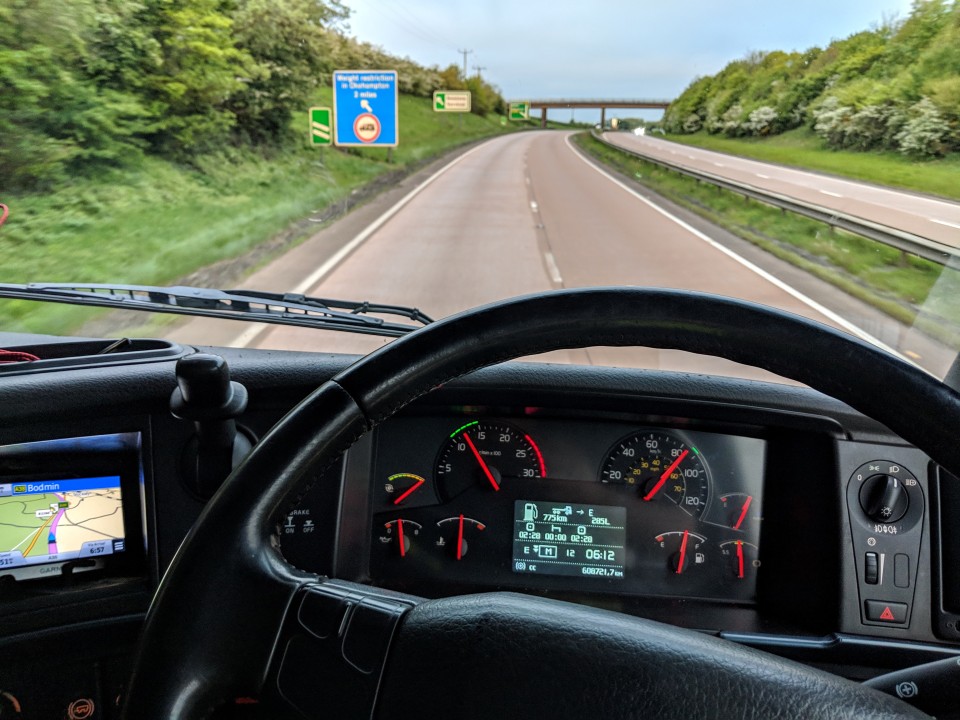
Susie Jones
Hogyan lehet egészséges teherautó-vezető
Létrehozva: 27. 08. 2024
•
Frissítve: 27. 08. 2024
A tehergépkocsivezetés, mint igényes szakma, gyakran hosszú munkaidővel, mozgásszegény életmóddal és otthonától távol töltött hosszabb időszakokkal jár, ami gyakran megviseli a járművezetők egészségét.
Az olyan egészségtelen szokások, mint a gyorséttermi ételek fogyasztása, a fizikai aktivitás hiánya és a zavaró alvási szokások mind-mind lehetséges egészségügyi komplikációkhoz vezethetnek a jövőben. De hogyan maradhat fitt teherautó-vezetőként? Könnyebb mondani, mint megtenni, de összeállítottunk egy listát tippekből, amelyek segítenek abban, hogy az út során is csúcsformában maradjon.
Hat legjobb tipp az egészség megőrzéséhez az úton
1.Hidratálás
Egyszerű tipp és egy olyan árucikk, amelyet gyakran természetesnek veszünk, azonban a legtöbb egészségügyi probléma a dehidratáció miatt következik be. A rendszeres korty víz vagy squash a nap folyamán kiűzi az anyagcsere-hulladékot és a méreganyagokat a szervezetedből, és energikusabb és éberebb maradsz. Egy újratölthető vizes palackot magánál tartva nemcsak arra emlékeztet, hogy hidratált maradjon, de a környezetnek is jobbat tesz.
2.Diet
A gyorséttermi ételek csábítása egy hosszú nap után olyasmi, amivel mindannyian azonosulni tudunk, azonban a folyadékpótláshoz hasonlóan az étrend is jelentős szerepet játszik az egészségedben, valamint abban, hogy végül hogyan fogod érezni magad a nap folyamán.
A tehergépkocsivezetőknek naponta háromszor-négyszer ajánlott étkezniük, vagy két étkezés és két uzsonna, vagy két étkezés és egy uzsonna formájában. Igyekezzen olyan étkezési és uzsonnatervet tartani, amely magas omega-3-, vas- és C-vitamin-tartalmú, például zöld leveles zöldségeket, halat és gyümölcsöket tartalmaz. Kerülje az olyan gyakran fogyasztott ételeket és italokat, mint a tésztafélék, a kenyér, az édes italok és az olyan élénkítőszerek, mint a kávé és az energiaitalok.
Nézze meg a fülkében tartandó egészséges rágcsálnivalók listáját:
Müzli szelet
Energiaszeletek
Popcorn
Mogyoró
Szárított gyümölcs
Étcsokoládé
Amellett, hogy útközben egészséges ételeket vásárolhat, néha egészségesebb és költséghatékonyabb is lehet az étkezés előkészítése. A Frieghtech fantasztikus receptválasztékkal rendelkezik, amely segít az egészséges táplálkozás fenntartásában munka közben.
3.Sleep
A munka jellegéből adódóan az elegendő alvás nehéz lehet a tehergépkocsi-vezetők számára, és ez az úton mindenki számára pusztító következményekkel járhat.
Az alábbi egyszerű tippek és trükkök segíthetnek abban, hogy tisztességes éjszakai alvást biztosítson:
Teremtsen olyan környezetet a fülkében, amelyben otthon érzi magát. Tekintse meg a teherautó fülkéjét otthonossá tevő bejegyzésünket.
Tartsa sötétben az alvóhelyet
Forró zuhany: Használja a térképek oldalunkat, hogy megtudja, mely kamionmegállók kínálnak ilyen lehetőséget.
Próbáljon ki néhány alkalmazást, hogy segítsen az alvásban
Keresse meg az ideális helyet a parkoláshoz, ahol kevés zajjal és zavaró tényezővel kell számolnia. Az intruck alkalmazásunk 5000 HGV (nehéz tehergépjármű) parkolóhelyet kínál Európa-szerte, amelyek közül választhat, míg a [SNAP Access and Security] (https://snapaccessandsecurity.com/) csapatunk személyre szabott biztonsági megoldásokat kínál, amelyek lehetővé teszik, hogy Ön és teherautója biztonságban tudjon aludni.
4.Gyakorlat
Az egyik legnehezebben betartható, de mégis fontos tipp. A hosszú órákon át tartó, egész napos ülés rossz testtartáshoz, hátfájáshoz és potenciális egészségügyi komplikációkhoz vezethet. Egy hosszú nap után a volán mögött csábító lehet, hogy üljünk és pihenjünk, azonban egy gyors 15 perces aktivitás, például séta vagy nyújtás felfrissítheti és kevésbé stresszesnek érezheti magát.
HMD Trucking néhány hasznos, teherautó-vezetőkre szabott gyakorlatot tartalmaz, ha többféle testmozgást szeretne beépíteni a rutinjába.
5.Vitaminok
A teljes munkaidőben történő utazás megnehezítheti a szükséges vitaminok bevitelét. A napi multivitamin szedése erősítheti az immunrendszerét, és segíthet megőrizni egészségét.
6.Mentális egészség
Tudjuk, hogy a fizikai egészségünkre való odafigyelés fontos az utakon, de vajon mennyi időt szánnak a teherautó-vezetők a mentális egészségükre?

A mentális egészséggel foglalkozó jótékonysági szervezet (Mind) statisztikákat tett közzé, amelyekből kiderül, hogy a szállítási és logisztikai ágazatban a saját maguk által bejelentett, munkával kapcsolatos betegségek 30%-a szorongás, magány, stressz és depresszió miatt következik be. Arra is utaltak, hogy ez a szám magasabb is lehet, mivel a legtöbben nem kérik a szükséges segítséget. Ráadásul a betegállományban lévők 95%-a nem adja meg a munkahelyi távollétének valódi okát, ha az a mentális egészségével kapcsolatos.
A fenti tippek és trükkök követése pozitív hatással lehet a mentális egészségre. Fontos továbbá, hogy nyílt és őszinte beszélgetéseket folytasson más tehergépkocsi-vezetőkkel, a felettesekkel vagy a diszpécserekkel.
Jobb vezetővé tehet a testmozgás?
Az egészséges életmód nem csak a mentális egészséget javítja, de bizonyítékok szerint jobb vezetővé is tehet. Egy tanulmány kimutatta, hogy azok a járművezetők, akiket arra kértek, hogy naponta gyakoroljanak, arról számoltak be, hogy könnyebben elfordították a fejüket, képesek voltak tovább forgatni a testüket, és gyorsabban be tudtak szállni az autójukba.
Mi a legnehezebb része a teherautó-vezetői munkának?
Úgy tűnik, a hosszú munkaidő az egyik legnehezebb része a teherautó-vezetésnek. A teherautósofőröknek gyakran hosszú kilométereket kell megtenniük és antiszociális munkaidővel kell szembenézniük. Ezek a hosszú kilométerek és antiszociális órák egészségtelen életmódhoz vezethetnek.

Mennyire egészségtelen kamionsofőrnek lenni?
Sok tehergépkocsi-vezető életmódja miatt statisztikailag átlagosan nagyobb valószínűséggel vannak egészségügyi problémáik, mint a más szakmákban dolgozóknak. A kamionosok gyakran szembesülnek néhány olyan akadállyal, mint a szűkös munkaterület, a stresszes helyzetek, a szokatlan alvási szokások és a tápláló ételek hiánya, amelyek mind hatással vannak az egészségükre.
Az egészséges életmód fenntartása tehergépkocsivezetőként tudatos erőfeszítést igényel, de az ebből származó előnyök összességében megéri. A fenti tippek lehetővé teszik, hogy kezébe vegye az irányítást az egészsége felett, és javítsa a közérzetét. Tartsa nyitva a szemét a további tippek és trükkök előtt tőlünk a SNAP-nál.



